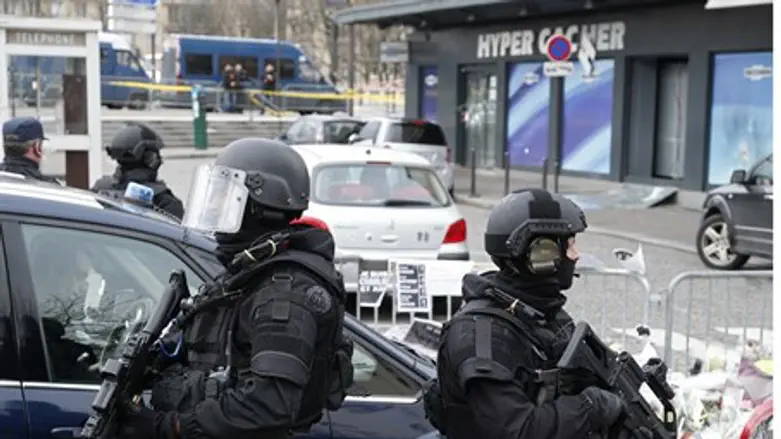
France unveiled a raft of measures Wednesday to curb radicalization and better monitor jihadists two weeks after an Islamist killing spree in Paris that sent shockwaves across Europe.
Jitters from the worst attack on French soil in decades have spread to the country's neighbors and the European Union is also expected to reveal new counter-terrorism plans on Wednesday.
As Paris scrambled to ramp up the battle against terrorism, a probe into the January 7-9 shootings which left 17 people dead saw four men charged with helping one of the Islamist gunmen.
Prime Minister Manuel Valls announced more than 700 million euros ($800 million) will be spent over the next three years on "the fight against terrorism."
The attacks by known Islamists exposed weaknesses in French intelligence, and Valls said some 3,000 people with jihadist ties needed to be monitored, adding that the number of people with links to "terrorist networks" in Syria and Iraq had soared by 130 percent in the past year.
In response, France will create 2,680 new jobs to fight extremism, just under half of them in the intelligence services.
And President Francois Hollande said France would slash 7,500 fewer military jobs than planned as part of steep defense cuts.
"The number one priority is to further reinforce the human and technical resources of intelligence services," Valls said, adding that a draft law to do just that would be debated in parliament in early March.
A large part of the effort to combat extremist violence will be concentrated on fighting radicalization, and Valls announced an extra 60 Muslim chaplains would be hired on top of the 182 who already work in jails.
Two of the Paris gunmen, Amedy Coulibaly and Cherif Kouachi, are believed to have turned to radical Islam in prison where they met, after coming under the influence of radical Islamist detainees.
France is already experimenting with the isolation of radical prisoners in one jail, and Valls wants to extend this to other penitentiaries.
The government is also targeting the Internet, with the creation of an informative website on radical indoctrination and more resources to monitor "cyber jihadism."
First suspects charged
France's worst terrorist attacks in decades began on January 7 when Cherif and his brother Said Kouachi gunned down 12 people in an attack on satirical magazine Charlie Hebdo.
Coulibaly the next day shot dead a policewoman, and the day after that killed four people in a hostage drama at a Jewish supermarket. All three gunmen were killed by police in dramatic raids.
Paris prosecutor Francois Molins said four men believed to have assisted Coulibaly were charged with conspiracy to commit terrorist acts, and one of them for possession and transport of weapons.
Investigators discovered that three of the men had on several occasions visited specialist stores around Paris to "buy equipment" such as knives, a taser gun, tactical vests and pepper spray.
However a probe into the Kouachi brothers had made little headway and could take "months, even years".
The attacks have forced France to face up to its failure to integrate poorer, migrant families, with Valls saying on Tuesday that the country was plagued by "social and ethnic apartheid".
Education officials are on Wednesday due to announce plans to boost civic spirit and respect of France's highly-prized secularism in schools, after a series of incidents where Muslim pupils refused to take part in tributes to the victims of the attacks and expressed support for the terrorists.
Valls said he would also propose a cross party debate on bringing back the offence of "national disgrace" - used after World War II against collaborators with the Nazi regime and abolished in 1951.
Less severe than treason, and allowing authorities to strip citizens of some rights, Valls said that reviving the offence would be a strong symbol of "the consequences of... committing a terrorist act."
Europe mulls security measures
The attacks prompted a flurry of police activity across Europe with raids taking place on suspected Islamist cells in Belgium and Germany.
In Brussels, European commissioners will meet Wednesday to discuss the 28-nation bloc's new counter-terrorism strategy, including changes to the region's Schengen free travel area and intelligence cooperation.
Many EU states have pushed for a US-style database of air travelers' details that would help track Islamist suspects, but the European Parliament has so far blocked the scheme saying it would breach civil liberties.
Some European nations have also been pushing for a tightening of the Schengen visa-free zone.
"They will discuss subjects including passenger name records and data retention, the functioning of the Schengen area and cooperation between security services," Commission spokesman Margaritis Schinas told a briefing ahead of Wednesday's meeting.
AFP contributed to this report.
